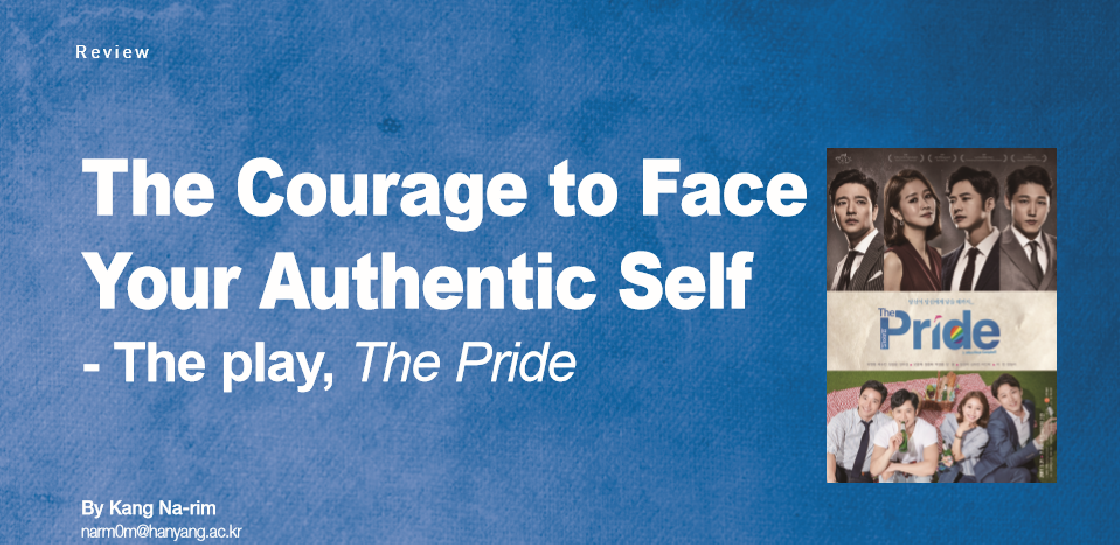
Having had its premiere in 2014 and a rerun in 2015, the Korean version of Alexi Kaye Campbell’s The Pride returned to the stage once again. The Pride is a play presenting the ordeals homosexuals have faced historically, which continues until today. The play unfolds through the juxtaposition of scenes regarding homosexual protagonists from the repressive 1950s and those from the more liberated, but still imperfect present. Throughout the entire play, the audience is taken on a time-traveling journey, which unfortunately reveals the social prejudices against homosexuals and their struggling mindset. It also questions whether we have truly learned to respect an individual’s true dignity after 60 years.
The first scene takes place in 1958. Philip and Sylvia are an apparently happily married couple, who are serving their guest Oliver with drinks in their flat before going out for dinner. Oliver is a children’s book writer, Philip is an estate agent, and Sylvia is a former actress who is now an illustrator working with Oliver. Throughout the act, it is evidently shown that Oliver, who is sensitive and intense, is homosexual. When Sylvia goes into the dressing room to look for her cape, Oliver and Philip are left alone, which creates an awkward tension between them. The audience becomes aware that the deeply closeted Philip is attracted to Oliver.
In the next scene, the play fast forwards to the year 2017 with the same characters, but in a different situation. A man dressed as a Nazi overtakes the stage, engaging in a perverted roleplaying game with a character also named Oliver. During the affair, a man named Philip enters Oliver’s house and it is soon revealed to the audience that Philip is Oliver’s boyfriend, who left Oliver because he was tired of Oliver’s cheating with strangers. Oliver curses himself and apologizes to Philip, but Philip, having been sick of his lover’s repetitive mistakes, decides to leave him for good. Oliver sadly calls Sylvia, who is both Oliver and Philip’s best friend and is aware of their relationship, to come over to his house and come up with a solution for their estranged relationship.
The scene changes back to Philip and Sylvia’s flat in 1958, with Sylvia talking to Philip about how she suspects he might be homosexual. Sylvia expresses her wish for him to live a happier life without her. Their marriage was full of insecurity, as Sylvia knew Philip was homosexual, but still loved him as a man. However, unlike the Sylvia of 1958 who sacrificed herself for the happiness of her husband, 2017’s Sylvia has a freewheeling lifestyle and is able to prioritize her own happiness above anything else.
The scene continues to 1958 when Sylvia leaves the house for a few days. Oliver visits Philip and declares his sincere love towards him. Unlike Oliver, who follows his true identity, Philip vehemently denies his feelings and tries to conform to society’s standards. He rapes Oliver and eventually ends up psychologically hurting himself.
Oliver and Philip’s relationship goes through trouble in both periods, each for different reasons. In 1958, Oliver was the one who was constantly trying to convince his lover to face his true self, whereas Philip helps Oliver to find his authentic self in 2017. Although it is expressed in two different ways, the progress of how each character handles his inner struggle to realize and accept his true self is depicted. This evokes a somewhat profound reflection in the audience, which urges them to carefully consider the concept of facing one’s authentic self. After Sylvia says in her monologue, “Until you truly reach yourself,” Oliver and Philip’s suffering is extended to the audience inviting them to ask themselves, “Have I reached myself?”
Specific aspects of the play, such as Oliver and Sylvia looking forward to the Gay Fair and the respect Oliver receives from his clients as a gay journalist imply the idea that the year we live in seems to be more tolerant to homosexuals in comparison to the past. However, prejudice remains because the effort to respect a person’s dignity in their true self still falls short. Thus, homosexuals still suffer from the difficulty of facing their authentic selves. Sylvia’s lines about the inconsistency in most people’s words against homosexuals stimulate the audience to think over if the problem has truly been solved.
The Pride mainly deals with homosexuals and their struggle to acknowledge their true identities, but the meaning extends to the conflicts that anyone could have between one’s inner self and the ‘self’ that the society wants them to be. Few may think that the modern world fairly embraces the ‘differences’ of selves as it constantly educates people to be understanding and tolerant. Unfortunately, the very fact that the requirement of that kind of attitude is constantly brought up, conversely means that this aspect of tolerance is yet to be melted into the society as a natural element.
As long as our society remains this way, and our mindsets reveal contradictions, The Pride will be in rerun forever. One day when this play disappears from the stage, we might be able to realize that we have come to respect each other’s dignity for its own sake.

